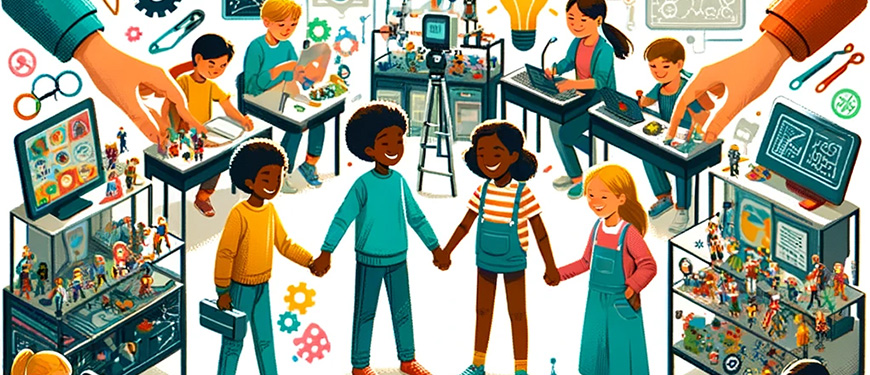Ensuring that all members of society have the skills and knowledge to thrive in a rapidly changing digital landscape
Research theme 1 focuses on identifying the key challenges and barriers to digital and technical literacy and developing new approaches to address them.
One key area of research is the development of new learning and training programs that are accessible and inclusive for all members of society. This involves the use of gamification or other interactive approaches to engage learners and help them build digital skills and confidence. Additionally, the research explores how to promote digital literacy among groups that may face particular challenges, such as older adults or individuals with disabilities.
Another area of research will explore the social and cultural impacts of digital technology and identify strategies for ensuring that these technologies are used in ways that are ethical, equitable, and sustainable. This could involve developing new frameworks for digital citizenship or exploring new models for digital governance that prioritize the needs and perspectives of diverse stakeholders.
Throughout this research, a key priority is to ensure that digital and technical literacy efforts are grounded in human-centred design principles and consider the needs and perspectives of diverse user groups. This involves partnering with community organizations and other stakeholders to develop tailored solutions that are responsive to local contexts and needs.
Finally, research in this theme focuses on exploring the potential of emerging technologies such as artificial intelligence (AI) and robotics to support digital and technical literacy efforts. This could involve developing new AI-powered tutoring systems or exploring the use of robotics to provide hands-on learning experiences.
Overall, the research on this theme is highly interdisciplinary, drawing on expertise from fields such as education, computer science, sociology, and anthropology. By working across disciplines, we are able to develop new insights into the challenges and opportunities of digital and technical literacy in society and develop solutions that promote equitable access to digital technologies and support the needs and aspirations of all members of society.
Core Challenges
Identifying the most critical digital and technical literacy skills needed by individuals and groups in society, and how these skills can be fostered and developed.
Design and implement more human-centred digital technologies that are accessible and inclusive for everyone, regardless of their background, abilities, or preferences.
Identifying the key barriers to digital and technical literacy and learning in society, and how to overcome them.
Approaches
We R&D new solutions across all technological platforms, from robots to AR/VR and beyond. We conduct action research, surveys, interviews, and focus groups with different populations to identify their digital and technical literacy needs and challenges. We also analyse existing training programs, educational materials, and instructional approaches to assess their effectiveness and identify best practices. Importantly, we collaborate with technology companies, teachers, student designers, developers and other users to co-create and evaluate more user-friendly and accessible digital tools and platforms.
Goals
- Guidelines and recommendations for digital and technical literacy education and training, based on empirical evidence and user-centred design principles.
- Tools and resources for improving digital accessibility and inclusion, such as assistive technologies, interfaces, and standards.
- Policy proposals and advocacy efforts to address systemic barriers to digital and technical literacy and learning, such as the digital divide, lack of funding, and inadequate infrastructure.
